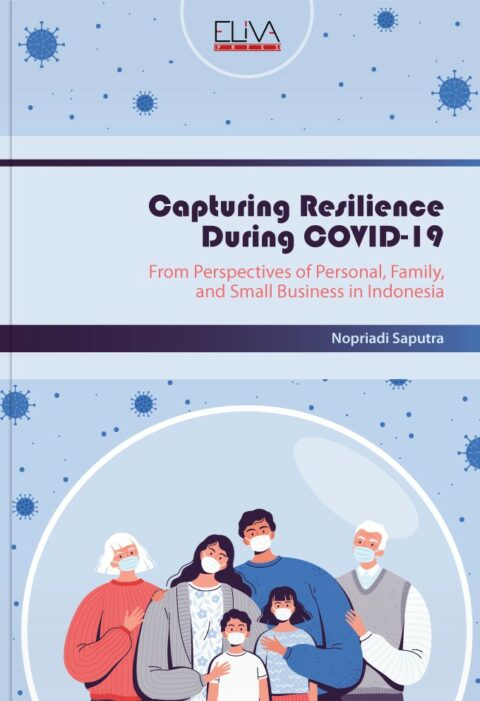Capturing Resilience during COVID-19: From Perspectives of Personal, Family, and Small Business in Indonesia

COVID-19 has been a disruptive phenomenon faced by more than 200 countries in the world. Indonesia as one of the countries with the largest population found that the COVID-19 pandemic caused a high death rate. COVID-19, which was originally a pandemic, then pushed the government to apply social distancing policy as a response to terminate rapid spread of the infected patients. The social distancing policy social distancing policies cause massive cessation of social and economic activities that triggered drastic changes in society. Before the COVID-19 pandemic era, people carried out various activities in various places. Once COVID-19 hit, people carried out various activities (e.g., work, study, shopping, and even worship) in only one place, namely their home. COVID-19 is not only a pandemic, but also disruptive to mental health, social life, and even has the potential to trigger an economic crisis.
Under these conditions, resilience becomes a strategic issue for a variety of social systems. It explains the ability to survive and be effective in dealing with and through pandemics. Resilience is an interesting theme to be studied empirically. This book – Capturing Resilience during COVID-19 was compiled based on three empirical studies about resilience in three different social systems. First, personal resilience which describes resilient ability of person or individual, resilience in perspective of individual life. Second, family resilience which defines resilience as collective competence of a family in responding difficulties during crisis. Third, business resilience which explain the organizational capability to face disruption with positive posture, to mitigate risk effectively, and to accelerate growth after crisis.
The first study is about personal resilience which has involved 694 educators as respondents. They are teachers (42%), lecturers (41%), facilitators in a community (12%), and corporate trainers (5%). This study is a collaboration of five social researchers: Nopriadi Saputra (Binus University), Fifi Khoirul Fitriyah (Universitas NU Surabaya), Hayat (Univeristas Islam Malang), and Ifit Novitas Sari (Malang Islamic University). This study attempts to examine the effect of physical, mental, and financial health on the personal resilience of Indonesian educators. The results of the study have been published at the Symposium on Social Science 2020 organized by Universitas Gadjah Mada.
The second study discusses about family resilience which successfully invited 296 youths from all over Indonesia as respondents. Social phenomena such as divorce, violence against children and women, disturbances in mental health due to isolation, illness, and death of family members as well as job losses make empirical studies on family resilience interesting. This study is a collaboration of three social researchers: Nopriadi Saputra (Bina Nusantara University), M. Asrorun Niam Sholeh (Universitas Islam Negeri Jakarta), and Adler Haymans Manurung (Unversitas Bhayangkara Jaya). This study tries to examine the effect of several factors (e.g., reproductive health, psychological maturity, personal financial management, and awareness of Islamic law on marriage) on the quality of parenting in children and family resilience. The results of this research have been published in the Journal of Psychology and Education.
The third study is related to business resilience which was endorsed by 506 small medium enterprises in Sumatera and Java, the two biggest islands in Indonesia. This study is a collaboration of many social researchers: Nopriadi Saputra (Bina Nusantara University), Danang Prihandoko (Bina Nusantara University), Rita Sari (IAIN Langsa Aceh), Siti Patimah (Universitas Islam Negeri Raden Intan), Syafrida H. Sahir (Universitas Medan Area), Endang Noerhartati (Universitas Wijaya Kesuma), Safriadi ( UIN Ar Raniry), Alfi Laila (Universitas Nusantara PGRI Kediri), Salmiah (Universitas Sumatera Utara), Iskandar Ahmaddien (Univesitas Lalang Buana), and Ika Widiastuti (Universitas Krisnadwipayana). This study attempts to examine the influence of various rational and irrational factors on the business resilience of SMEs. The results of this study have been published in the GATR Journal of Management and Marketing Review.
Indeed, COVID-19 causes many problems that disrupt human life globally. But on the other hand, COVID-19 provides many interesting phenomena to study and research. Because conditions like today are not experienced by every generation. Our current generation could take a photograph this phenomenon in various empirical studies. Hopefully, this book will be useful. It is not only for our generations who experience COVID-19 as a disruptive event. But it is also useful for generations who live in later times.
Jakarta, July 12th, 2021
Nopriadi Saputra
Saputra, N. (2021). Capturing Resilience during COVID-19: From Perspectives of Personal, Family, and Small Business in Indonesia. Chisinau, Republic of Moldova: Eliva Press

